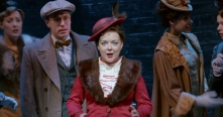24/05/20
wedgwoodtherestaurant.co.uk
It’s Week Ten in the Year of Our Lockdown, and I am missing eating out. I love the whole restaurant experience: the theatre, the bustle. But, if that’s not available, I’ll settle for just the food.
Like many establishments across the country, the normally premises-bound Wedgwood Restaurant (Canongate, Royal Mile, Edinburgh) is offering a takeaway service at the moment: a three course meal for £22. This is a ‘cook at home’ menu and, to be honest, there’s a little bit too much cooking involved: we have to write down the timings so we don’t mess it up, and it doesn’t feel very relaxing. Maybe it would work better if we had an open-plan kitchen-diner, but we don’t, so we’re scuttling between the table and the stove, conversations left hanging or shouted between two rooms.
Still, the food is very good, and the evening does feel special.
To start, Philip has a smoked salmon and dill paté, which is served with crumbed oatcake, blistered tomatoes, baby gem and toast. The paté has a pleasant citrusy flavour, but there’s a lot of it and not much toast. I have roast cauliflower velouté with a coriander and cashew crumb and red pepper oil. It’s lovely: a creamy, indulgent delight.
My main is roast smoked mackerel, with a spring onion and black olive potato cake, green beans and a chorizo hollandaise. It’s perfectly judged, the intensely flavoured fish well complemented by the robustness of the olives and chorizo. Philip has a lemon and thyme scented confit chicken leg with braised fennel, lentils and a gorgeously shiny honey and grain mustard jus. The whole meal is delicious, but it’s the jus that makes it.
We add in our own cheese course, because we want to, because this is our ‘date night’ and we want it to last. We have a subscription to Pong cheese, so we share three small pieces, with some onion chutney and home-made crackers.
Then pudding. We share a sticky toffee pudding with butterscotch sauce and a dark chocolate brownie with milk chocolate cremeaux, white chocolate and sweet cicely pesto and raspberries. This final course is the winner: every mouthful feels like a treat. It’s sticky and sweet and wonderful.
Wedgwood offer wine with their menu, but we have laid in a good stock from Majestic, so we open a bottle (okay, two) of Chenin Blanc (La Baume de La Grande Oliviette), and enjoy.
And, all in all, for a night in, this is pretty good.
But I’d still prefer a night out. Without the washing up.
4 stars
Susan Singfield





























